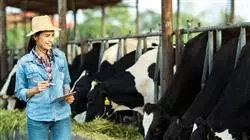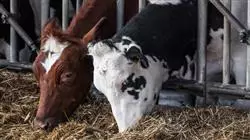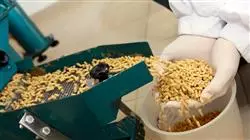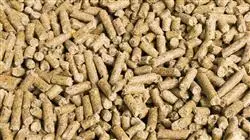
Certificate
The world's largest faculty of nutrition”
Description
Join the elite with this highly effective educational program and open new paths to your professional progress”

With the current world population estimated at 7.6 billion, it is expected to increase to 8.6 billion by 2030, and animal nutrition is one of the disciplines called upon to help solve the problem of producing sufficient and economical protein to feed this growing demand in an efficient and sustainable manner.
This intensive specialization is designed for professional nutritionists to update and perfect their technical and practical knowledge in this sector.
This Program in Ruminant Nutrition and Feeding develops the main aspects related to digestive physiology, nutrition and feeding of ruminants and their marked anatomical and physiological differences with respect to the other species studied, which allows them to have, as a main characteristic, the ability to take advantage of resources rich in fiber, such as pasture and forage, which have little nutritional value for non-ruminant species.
With an innovative format, this specialization allows participants to develop autonomous learning and optimal time management.
Become one of the most demanded professionals of the moment: train with this postgraduate diploma in Ruminant Nutrition and Feeding"
This postgraduate diploma in Ruminant Nutrition and Feeding contains the most complete and up-to-date scientific program on the market. The most important features of the program include:
- The latest technology in online teaching software
- Intensely visual teaching system, supported by graphic and schematic contents, easy to assimilate and understand
- Practical cases presented by practising experts
- State-of-the-art interactive video systems
- Teaching supported by telepractice
- Continuous updating and recycling systems
- Autonomous learning: full compatibility with other occupations
- Practical exercises for self-assessment and learning verification
- Support groups and educational synergies: questions to the expert, debate and knowledge forums
- Communication with the teacher and individual reflection work
- Content that is accessible from any fixed or portable device with an Internet connection
- Supplementary documentation databases are permanently available, even after the course
A course that will enable you to work in the ruminant production sectors, with the solvency of a high-level professional"
TECH teaching staff is made up of professionals from different fields related to this specialty. That way, TECH ensures to offer students the educational program and updating intended. A multidisciplinary team of professionals prepared and experienced in different environments, who will cover the theoretical knowledge in an efficient way, but, above all, will bring the practical knowledge from their own experience to the program: one of the differential qualities of this program.
This mastery of the subject is complemented by the effectiveness of the methodological design of this postgraduate diploma. Developed by a multidisciplinary team of e-learning experts, it integrates the latest advances in educational technology. In this way, our students will be able to study with a range of convenient and versatile multimedia tools that will give them the operability they need during the program.
The design of this program is based on Problem-Based Learning: an approach that conceives learning as a highly practical process. To achieve this remotely, telepractice will be used: with the help of an innovative system of interactive videos, and learning from an expert they will be able to acquire the knowledge as if they were facing the case they are learning in real time. A concept that will allow students to integrate and memorize what they have learnt in a more realistic and permanent way.
You will be able to download detailed videos, analysis of clinical cases, interactive summaries and other complementary material of great interest"

You will have access to advice and practical tips from a team of specialists in Ruminant Nutrition and Feeding"
Objectives
TECH objective is to prepare highly qualified professionals for work experience. An objective that is complemented, moreover, in a global manner, by promoting human development that lays the foundations for a better society. This objective is focused on helping medical professionals reach a much higher level of expertise and control. A goal you will easily achieve with a course of high intensity and precision.

If your goal is to reorient your skills towards new paths of success and development, this is the course for you: a specialization that aims for excellence"
General Objectives
- Determine the properties, use and metabolic transformations of nutrients in relation to the nutritional needs of an animal
- Provide clear and practical tools so that the professional can identify and classify the different foods that are available in the region and have better elements of judgment to make the most appropriate decision in terms of differential costs, etc
- Propose a series of technical arguments which allow for a better quality of diet and nutrition and therefore, improve the end produce (meat or milk)
- Analyze the different raw material components with both positive and negative effects on Animals. Nutrition and how animals use them for the production of animal protein
- Identify and understand the different levels of digestibility for each of the various nutritional components according to their origin
- To analyze the key aspects for the design and creation of diets (food) aimed at achieving the maximum utilization of nutrients by animals intended for animal protein production
- Provide specialized expertise on the nutritional requirements of the two main poultry species for animal protein production
-
Develop specialized understanding of the nutritional requirements of the porcine species and the different feeding strategies needed in order to guarantee that they reach the expected welfare and production standards according to their production stage
- Provide practical, theoretical and specialized knowledge on the physiology of canine and feline digestive systems
- Analyze the digestive system of ruminants and their particular way of assimilating nutrients from fiber-rich foods
- Analyze the main additive groups used in the food production industry, focused on ensuring the quality and performance of different food products
- Analyze, in a clear way, how the complete animal feed manufacturing process is developed: the phases and processes which feed undergoes to guarantee its nutritional composition, quality and safety
Specific Objectives
Module 1. Nutrients and Metabolism
- Develop the different nutrients contained in the raw materials used in animal nutrition
- Develop the different components of each one of the nutrient groups
- Determine the destinations or metabolic pathways of nutrients to be utilized by the animal
- Establish how animals obtain energy from different nutrients and what energy metabolism consists of
- Analyze the different assimilation processes of nutrients that different species of animals have and which are necessary for their well-being and production
- Evaluate the importance of water as a nutrient and the effect that it has on animals
Module 2. Digestibility, Ideal Protein and Advances in Animal Nutrition
- Develop the concepts of digestibility and how it is determined
- Analyze advances in protein nutrition and the importance of synthetic amino acids in animal nutrition
- Identify the factors which are involved in the definition of the different nutrient levels
- Establish the critical points in the use of fats, their quality and effect on nutrition
- Develop the basic concepts of organic minerals and their importance
- Justify the concept of intestinal integrity and how to enhance it in production
- Analyze patterns in the use of antibiotics in veterinary nutrition
- Define the patterns in precision nutrition and the most influential factors in its application
Module 3. Nutrition and Food in Ruminants
- Analyze the digestive system of ruminants and their particular way of assimilating nutrients from fiber-rich foods
- Analyze the nutritional metabolism of ruminants, recognising their potential and their limitations
- Determine the nutritional requirements for the maintenance and production of the main ruminants of zootechnical interest
- Examine the main food resources for ruminants’ nutrition, their main characteristics, their advantages and limitations
- Evaluate the main feeding strategies for ruminants according to the production context

A path to achieve specialization and professional growth that will propel you towards a greater level of competitiveness in the employment market"
Postgraduate Diploma in Ruminant Feeding and Nutrition
Ruminant animals have a complex and unique digestive system that allows them to digest cellulose and other plant fiber components through bacterial fermentation in the rumen. Therefore, the diet of these living creatures must contain a variety of nutrients, including proteins, carbohydrates, fats, vitamins and minerals, in adequate amounts to meet their specific nutritional needs. And you will be able to go deeper into all these aspects with this Postgraduate Diploma in Nutrition and Feeding of Ruminants from TECH.
Master the physiological and anatomical characteristics of ruminants to design the best nutritional plans.
The Postgraduate Diploma in Nutrition and Feeding of Ruminants focuses on the fundamental aspects of digestive physiology, nutrition and feeding of ruminant animals. To this end, it considers the distinctive anatomical and physiological differences that allow them to take advantage of fiber-rich resources, such as pastures and forages, which have little nutritional value for other non-ruminant species. Thus, this program is designed to launch your career in this area under a convenient online modality, for which you will use dynamic educational resources that you will manage in the terms you deem appropriate.






